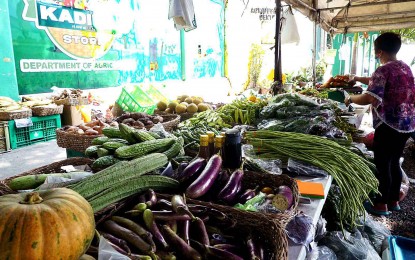
Fresh vegetables sold at a Kadiwa store (PNA photo by Ben Briones)
MANILA — Over 160 tons of highland vegetables had been sold and will be sold this month through Kadiwa’s Veggie Connect and other market linkage programs, preventing food wastage, the Department of Agriculture (DA) said Wednesday.
“The move will provide a much-needed financial boost to close to 100 farmers, preventing potential food wastage and providing consumers access to cheaper food,” DA Agriculture Secretary Francisco Tiu-Laurel Jr. said in a statement.
Regional Executive Director-Cordillera Administrative Region officer- in-charge Jennilyn Dawayan has reported that 163,189 kilograms of vegetables were sold and will be sold until Jan. 26, 2024, assisting 93 farmers from the provinces of Mountain Province, Benguet and Ifugao.
“We will continue to provide Kadiwa services to farmers as may be needed,” she said.
“The Kadiwa Veggie Connect started as a collaboration with the Cordillera Association of Regional Executives to help DA monitor vegetable supply and amount of unsold vegetables, particularly cabbages and Chinese cabbage whose prices have fallen due to a supply glut.”
Unsold vegetables from various trading posts totaling 11 tons were initially procured by the national government offices in Baguio City and neighboring areas between Jan. 5 and 6.
From Jan. 8 to 14, farmers sold 44 tons, followed by 105.6 tons a week later at prices ranging from PHP10 to PHP15 per kilo.
Most traders prefer new harvests over older ones and this affects the prices of vegetables.
To prevent prices of vegetables from falling further at trading posts, some vegetable farmers in the Cordilleras usually opt to dump their older inventory.
Tiu-Laurel wants to improve and expand market access for farmers and fisherfolk as part of his 8-point plan to modernize agriculture, increase food production, lower food cost, ensure food security, and make farming and fishery a bankable investment alternative.
“It’s our goal to make agriculture a profitable venture for millions of farmers, fishermen and others in the value chain. By helping them bring their products directly to market, we’re not only helping agriculture workers and entrepreneurs but providing consumers access to lower-priced food products,” he said.
He added that he considers replicating this program in other parts of the country and in other agricultural products such as poultry, livestock, fish and high value crops. (PNA)
